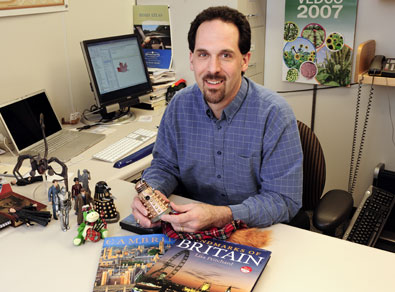Inside Iowa State
Inside ArchivesSubmit newsSend news for Inside to inside@iastate.edu, or call (515) 294-7065. See publication dates, deadlines. About InsideInside Iowa State, a newspaper for faculty and staff, is published by the Office of University Relations. |
Jan. 16, 2009 
James Reecy, associate professor of animal science, spent a year studying bioinformatics of genomes at the Wellcome Trust Sanger Institute near London. Photo by Bob Elbert. Year abroad was lots of learning, a 'bit' of funby Dan Kuester, News Service When the Reecy family returned to Iowa after spending a year overseas, they brought back keepsakes, like anyone would. T-shirts, clothes and other knickknacks help remind the family of the good times they had. They also brought back something they didn't even have to pack. The word 'bit.' "My wife and I noticed we are saying it all the time now," said James Reecy of the linguistic souvenir. "They use it all the time over there, 'a little bit of this,' 'can you wait a bit?'" Reecy, his wife Tracy, and sons Nick (12) and Marcus (10) spent a year, August 2007 through August 2008, in England while Reecy worked at the Wellcome Trust Sanger Institute. An associate professor in animal science, Reecy specializes in beef cattle genomics. The Sanger institute, a world leader in cataloging animal genomes, is located about 40 miles north of London, near Cambridge. Reecy's charge at the institute was to find out more about genome annotation and bioinformatic analysis of genomic sequence to help him as coordinator of the bioinformatics coordination program of the USDA and the Cooperative State Research, Education and Extension Service. What to do with genome sequencesThe year in England helped Reecy better understand the information resources the institute can provide, and also the limitations. "We are trying to learn more about bioinformatic analysis of genome data," said Reecy. "We are learning how to handle the genome sequences and what questions to ask. "We were also there because they are a large genome sequence provider. We learned what they will do, and what they will not do for livestock species, and what are the things that we have to do ourselves as a livestock community," he added. Reecy is especially interested in the genetic information on cattle. Through this research and selective breeding, Reecy is optimistic that beef can become a more healthful food within a few years by using genetic information. "What we're really after is improved fatty acid composition," he said. "Beef has had a bad reputation because it has been considered a source of unhealthy fatty acids. We now know that we can make huge changes in fatty acid composition in just a couple generations by selecting genetically superior animals." Improving beef nutrients"The challenge in the past was identifying those superior animals, but upon completion of an ongoing project, this should no longer be the case," Reecy said. "We should soon be able to improve human health by improving the nutrient composition of beef." Reecy believes this approach to the beef industry is unusual but also helpful to producers. "Normally, to help producers we [animal scientists] have worked to increase production efficiency. This is a change away from that philosophy," he said. "If we can make beef healthier to eat, it will increase consumer demand. Increasing demand will help producers. In the end, everyone wins." Not exclusively beefThe information Reecy learned at the Sanger institute will help him professionally, but beef genomes weren't the only thing Reecy learned in England. "I know for a fact that they have tastier pints [of beer] in England than they do here," said Reecy of his other learning experience. "One of the things we started to do was collect the bottle tops from the ales that we found because my nephew collects bottle tops," he said. "I don't know how many we got for him that he otherwise would have never been able to collect." His family also enjoyed the British experience. Reecy's sons found a new favorite food (fish and chips), and favorite TV show (Doctor Who). They got interested in "football" (soccer), and Marcus became a fan of the team from Chelsea while Nick, naturally, adopted rival Manchester United. As they settle back in to their lives in the United States, the family occasionally looks at the knickknacks they brought back, or puts on their souvenir soccer jerseys and cheers for their favorite teams on television. They also eagerly await the release of the Doctor Who Christmas special in the states. After all, it's just for a bit of fun. |
Quote"Beef has had a bad reputation because it has been considered a source of unhealthy fatty acids. We now know that we can make huge changes in fatty acid composition in just a couple generations by selecting genetically superior animals." -- James Reecy |